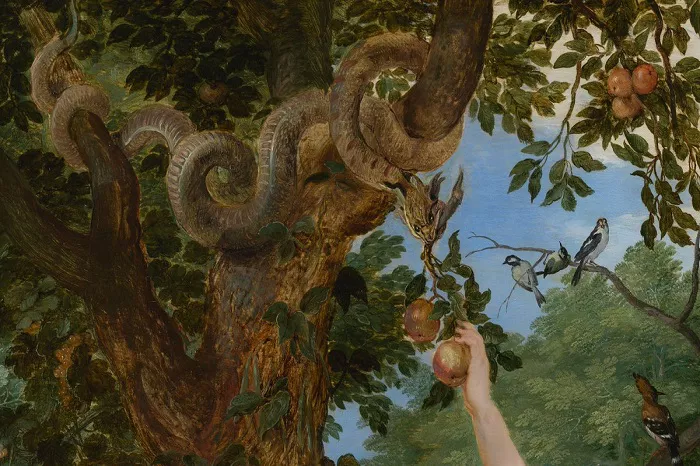The serpent is a central figure in the early chapters of Genesis. It appears in the Garden of Eden and plays a crucial role in the narrative of the Fall of Man. Understanding the serpent’s role helps us comprehend the nature of temptation, sin, and the human condition. It also provides insight into the broader themes of good and evil in the Bible.
The Serpent’s First Appearance
The serpent first appears in Genesis 3:1. The verse says, “Now the serpent was more crafty than any of the wild animals the LORD God had made.” This introduction sets the stage for the serpent’s actions and foreshadows its role in the story.
See Also: The 20 Most Popular Bible Verses from Genesis
The Serpent’s Craftiness
The serpent is described as “crafty” or “cunning.” This suggests intelligence and deceit. The serpent’s craftiness is a key aspect of its role. It uses its cunning to manipulate and deceive Eve. This characteristic contrasts with the innocence and trust of Adam and Eve before the Fall.
The Temptation of Eve
The serpent engages Eve in conversation. It begins by questioning God’s command. “Did God really say, ‘You must not eat from any tree in the garden’?” (Genesis 3:1). This question introduces doubt. The serpent’s goal is to undermine Eve’s trust in God’s word.
Distortion of God’s Command
The serpent distorts God’s command. It suggests that God is withholding something good from Adam and Eve. The serpent says, “You will not certainly die… For God knows that when you eat from it your eyes will be opened, and you will be like God, knowing good and evil” (Genesis 3:4-5). This lie is designed to make the forbidden fruit seem desirable and God’s command seem restrictive.
The Serpent’s Deception
Eve is deceived by the serpent. She sees that the fruit is “good for food and pleasing to the eye, and also desirable for gaining wisdom” (Genesis 3:6). The serpent’s deception leads Eve to eat the fruit. She then gives some to Adam, who also eats it. This act of disobedience is the first sin.
The Immediate Consequences
The immediate consequence of eating the fruit is that Adam and Eve’s eyes are opened. They realize they are naked and feel shame. They make coverings for themselves from fig leaves. This marks the loss of innocence and the beginning of a new awareness of good and evil.
God’s Judgment on the Serpent
God confronts Adam, Eve, and the serpent. He pronounces judgments on each of them. To the serpent, God says, “Cursed are you above all livestock and all wild animals! You will crawl on your belly and you will eat dust all the days of your life” (Genesis 3:14). This curse indicates a fall from a previous state and a life of humiliation.
The Protoevangelium
God also declares enmity between the serpent and the woman, and between their offspring. He says, “He will crush your head, and you will strike his heel” (Genesis 3:15). This verse, known as the Protoevangelium, is seen as the first promise of a Redeemer. It foreshadows the ultimate defeat of the serpent by Jesus Christ.
The Serpent as a Symbol
The serpent in Genesis is more than just an animal. It symbolizes Satan, the adversary of God and humanity. The New Testament explicitly identifies the serpent with Satan. Revelation 12:9 refers to “that ancient serpent called the devil, or Satan, who leads the whole world astray.” This identification links the serpent’s deception in Eden to Satan’s ongoing work of deception.
Theological Implications
The serpent’s role in Genesis has significant theological implications. It introduces the concept of temptation and the reality of spiritual warfare. The serpent’s actions highlight the nature of sin as disobedience to God’s command. They also emphasize the importance of discernment and trust in God’s word.
The Serpent’s Role in Human History
The serpent’s deception of Eve set the course for human history. It led to the Fall, which brought sin and death into the world. This event explains the presence of evil and suffering in the world. It also underscores the need for salvation and the hope of redemption.
Lessons from the Serpent’s Role
Several lessons can be learned from the serpent’s role in Genesis. First, the story warns us about the danger of deception. The serpent’s craftiness shows that temptation can be subtle and appealing. Second, it teaches us the importance of obedience to God. Adam and Eve’s disobedience had catastrophic consequences. Finally, it reminds us of the promise of redemption. Despite the Fall, God provided a way for humanity to be restored.
The Serpent in Later Biblical Context
The theme of the serpent continues throughout the Bible. In the wilderness, the Israelites encounter fiery serpents. God instructs Moses to make a bronze serpent and lift it up. Those who look at it are healed (Numbers 21:8-9). Jesus refers to this event in John 3:14-15, comparing it to His crucifixion. This connection highlights the serpent’s role in the broader narrative of salvation.
The Serpent and the End Times
In the book of Revelation, the serpent reappears. It is depicted as a dragon, waging war against God’s people. However, its ultimate defeat is assured. Revelation 20:2-3 describes the serpent being bound for a thousand years. This final victory fulfills the promise of Genesis 3:15 and brings the story full circle.
Conclusion
The serpent in Genesis plays a crucial role in the story of the Fall. It introduces deception, temptation, and sin. Its actions lead to significant theological themes, such as the nature of evil and the need for redemption. By understanding the serpent’s role, we gain insight into the human condition and God’s plan for salvation. The serpent’s story reminds us of the ongoing spiritual battle and the ultimate hope of victory through Jesus Christ.


